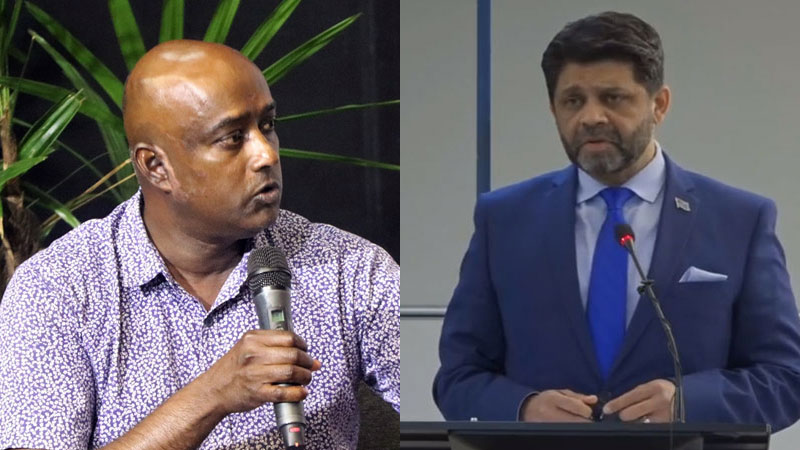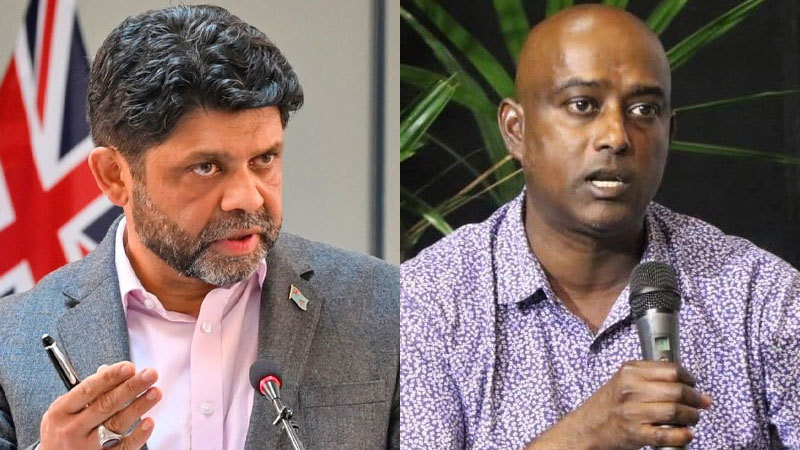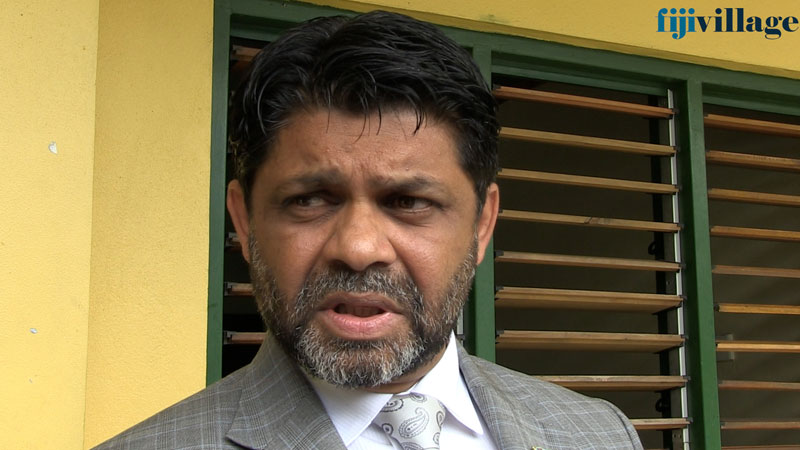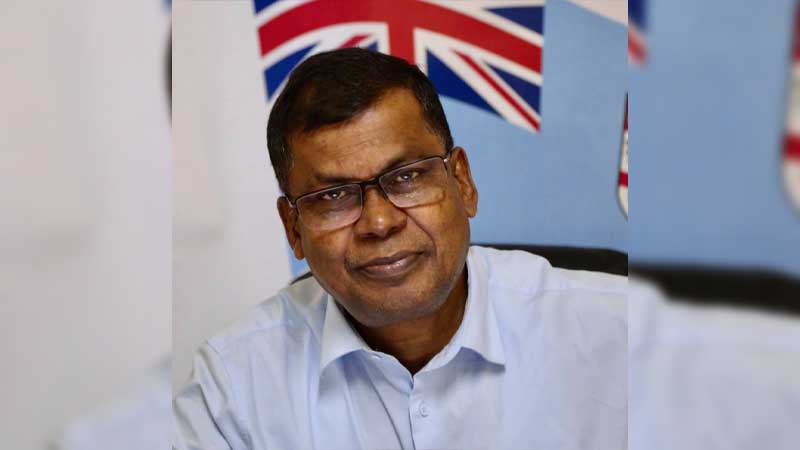
USP economist, Neelesh Gounder says the Attorney General, Aiyaz Sayed-Khaiyum is overreacting, misinterpreting and sidestepping the issues Gounder had raised.
Gounder says he has mentioned that while Sri Lanka's case is more complex, there are certainly important lessons for Fiji.
The USP economist says his comments were, as always, based on an intellectual, not political criteria.
Gounder says as an academic, he is committed to seeking and sharing independent economic analysis, even when they may be challenging political power.
The economist says it seems as the political campaign turns, it is turning into an attack on the independence and integrity of academics and experts.
He also says for Government debt, the stage for a debt distress has been in the making for some time.
Gounder says with the type of explosion of debt from 2019 to 2021, Fiji will need a more radical solution rather than just relying on future prospects of economic growth to take care of debt.
The USP economist says as debt-service costs are becoming increasingly burdensome, the fiscal space needed to confront other challenges will not exist.
He says with this trend in debt and the uncertain economic circumstances ahead, the chances of debt restructure in the future remains high for Fiji.
Minister for Economy and Attorney General, Aiyaz Sayed-Khaiyum is calling on independent academics and commentators to provide objective and honest analysis of the Fijian economy.
In a statement, Sayed-Khaiyum says do not be like or be misled by politically biased academics like Professor Wadan Narsey and Neelesh Gounder and their political masters whose continuous and blatantly biased analysis continues to discredit their reputation.
He says academics in Fiji should provide more balanced, accurate and fair commentary on such issues and not try to mislead people due to their political inclinations.
Sayed-Khaiyum says recently, Wadan Narsey also claimed that Government robbed FNPF members of $380 million by reducing the FNPF rate.
He says Narsey completely ignored the fact that it was the Bainimarama Government that increased the employer contribution rate from 8 to 10 percent in 2015.
The Minister for Economy says employers had contributed much more in that extra 2 percent than what they benefitted from with the recent reduction during COVID.
Sayed-Khaiyum says Narsey's comments also show how detached he seems to be from understanding the severity of the COVID crisis and its impact on business and economic activity and the impact especially on employers, globally and in Fiji.
He says Narsey seems to not appreciate the fact that employee welfare can only be improved if both employers and employees are doing well and are supported.
The Minister says with business revenues declining drastically majority of employers needed some form of relief and the reduced FNPF contribution rate provided that much-needed relief, as part of a wider policy package designed to ensure the survival of many businesses.
He says that's how the Government has managed to keep businesses afloat and revive them.
Sayed-Khaiyum says if they followed Wadan Narsey’s recipe, many businesses would have been closed and thousands of Fijians permanently unemployed.
He says Narsey also ignores that employee contributions were also reduced as employees wanted more take home pay during the pandemic crisis.
Professor Narsey is yet to comment.

Minister for Economy, Aiyaz Sayed-Khaiyum says the Sri Lankan economic crisis is due to promises by the Government which was in opposition before the crisis to bring about a widespread cut in taxes – promising the moon and the stars, something which some of the opposition parties are proposing here in Fiji.
While responding to USP economist, Neelesh Gounder, the Minister for Economy says the Fijian Government avoided the crisis that Sri Lanka experienced, and the risks of a Sri Lanka-like crisis are far greater if the opposition comes into power.
Sayed-Khaiyum says comparing the ongoing Sri Lankan economic and debt crisis with Fiji is like comparing apples and fish.
According to the Minister, Gounder’s blatant bias due to his political affiliations with NFP and People’s Alliance is clearly demonstrated through his shoddy economic analysis.
Sayed-Khaiyum says in fact, Sri Lanka has a lot to learn from how Fiji managed the COVID-19 crisis by borrowing smartly to ensure our debt and balance of payments remain sustainable.
He says Sri Lanka does not have adequate foreign reserves available in the country.
The Minister for Economy says Sri Lanka had $7 billion due in external debt repayments alone and only had $2 billion in total foreign exchange.
Sayed-Khaiyum says Fiji's external debt repayments on average are less than $100 million annually and we have over $3 billion available in foreign reserves. He says this is 30 times more than what's needed for our external debt repayments.
He says this is despite the tourism industry being closed for almost two years which used to bring in over $2 billion of foreign exchange to the country annually.
The Minister for Economy also says Fiji has over 10 times more government revenue available to service interest payments.
Sayed-Khaiyum says Fiji’s revenues are over $3 billion in a normal year and debt servicing is just over $350 million in interest payments.
He says for Fiji to be unable to service its debt our revenue will have to fall below $300 million – which is an extremely unlikely scenario.
The Economy Minister says even during COVID-19, Fiji managed to maintain revenues at around $2 billion.
He says this basically shows why Fiji has not defaulted on debt before and why we will never default now or in future.
Sayed-Khaiyum also says Sri Lanka's lenders stopped lending to them.
He says Fiji’s lenders have recently been lending five times more than what they were lending before and continue to want to lend more.
The Minister says these are all credible lenders like the World Bank, ADB, JICA, AIIB and other domestic institutional investors. He says for these lenders to want to lend more to Fiji means they have full confidence that Fiji will never default on its debt payments.
According to the 2021/2022 National Budget, Government debt is forecast to reach $9.1 billion, equivalent to 88.4 percent of GDP by end of July 2022.
Fiji’s domestic debt is forecast at $5.8 billion and external debt is forecast at $3.3 billion.

Minister for Economy, Aiyaz Sayed-Khaiyum says external debt is not bad if it's priced well and long term which Fiji was able to secure unlike short-term debt like bonds that has bullet repayment in Sri Lanka.
He says Fiji has secured around $900 million in highly concessional external debt with long maturity terms of 40 years, 10 year grace period and near-zero interest rates.
While responding to USP economist, Neelesh Gounder, the Minister says Fiji’s debt repayment is spread over many years while Sri Lanka had bonds that had to be paid in a bullet repayment.
Sayed-Khaiyum says Fiji’s only global bond of US$200 million was settled in the middle of the COVID-19 crisis in October 2020.
He says the global bond was initially raised in 2006 by the Qarase Government.
The Minister says Fiji does not hold any internationally-issued bonds as part of its debt portfolio.
He also says Fiji has used debt for building capital infrastructure which ensures that it generates returns to pay our debt in the future.
The Minister says this may not be true for Sri Lanka.
Sayed-Khaiyum says Fiji also has third-party validation that Fiji's debt remains sustainable from agencies like IMF, World Bank, ADB, ANZ, Westpac and our international credit rating agencies.
He says the same agencies have been warning Sri Lanka for some time.
We have sought comments from Neelesh Gounder. He says he will respond soon.
Wednesday 04/05/2022

National Federation Party Leader, Professor Biman Prasad says obviously the Minister for Economy, Aiyaz Sayed-Khaiyum is once again attacking the messenger and economists Professor Wadan Narsey and Neelesh Gounder could teach him a lot.
He says under his and Bainimarama’s 15 years government, they have added about $6 billion debt as opposed to 36 years of economic management right up to 2006 which had $2.8 billion in debt.
Prasad says Sayed-Khaiyum does not admit that his style of economic management was one of reckless spending, borrowing and spending before the election.
He says Sayed-Khaiyum should focus on real issues instead of attacking people and associating individuals to political parties.
He says these two individuals are recogized not only in the Pacific but the world for their economic credentials and when they say something, they say it with sincerity and honesty.
The party leader says Professor Narsey’s analysis on FNPF is spot on.
He further says Sayed-Khaiyum is putting out less than honest information to the people of this country.
Prasad adds the only reason why we are asking lenders more is because we do not have that fiscal space to fund undertakings.
Stay tuned for the latest news on our radio stations


